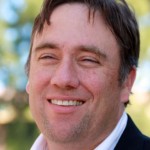Opinion: Colluding with California’s Russian
By Joe Mathews
Take my guilty plea, Mr. Mueller. Because this Californian is colluding with a Russian.
Specifically, that most alluring of Russians, the Russian River, which seductively winds through Mendocino and Sonoma counties to the Pacific. Traveling the length of the Russian—as I recently did—reminds you that California and Russia are too intertwined for scandal to keep us apart.

Joe Mathews
Russian interference in California is older than the state itself. Our state’s top industries, entertainment and technology, have been defined by Russian emigres from songwriter Irving Berlin to Google’s Sergey Brin.
Then there is the mystical connection between California and Russia, two of this planet’s greatest puzzles. Each territory is considered too vast, and its people too strange, to ever be truly understood. Winston Churchill famously called Russia “a riddle wrapped in a mystery inside an enigma”; anyone familiar with California’s governing system knows that those words apply to the Golden State too.
On my excursion, I stopped at Fort Ross, a Russian settlement established in 1812, an eventful year for invasions, with Britain attacking the United States, and the Russians repelling Napoleon—a victory so great that Tchaikovsky’s overture about it is performed each summer at the Hollywood Bowl. The Russians’ presence gave the river its name.
The Russian-American Company, which established Fort Ross, constructed the first windmill and first ship ever built in California. But like so many California arrivals, the Russians found the cost of living was high, and business ventures unprofitable. So in 1841 the Russians sold off Fort Ross, like a failed startup, to John Sutter, who had all the assets hauled to Sacramento.
Ever since, the cover story has been that the Russians abandoned California to Mexicans and then the Americans. But California actually made the fort larger and turned it into a state park. In recent decades, with tens of thousands of tourists visiting from the motherland, Fort Ross sees far more Russians than it ever did under Russian rule.
From Fort Ross, I drove back to the river in tiny Jenner. There, the Soviet Union’s hammer-and-sickle flag flies over a restaurant, Russian House #1.
The restaurant’s founders, Tatiana Ginzburg and Polina Krasikova, are Russians, who split time between Sonoma County and St. Petersburg. Ginzburg, a psychologist, explained that the restaurant is really “a space for dialogue between two great cultures and peoples.”
It also challenges capitalist thinking. There is no menu, no prices, and no bill—you pay what you think is right, in a bowl by the door.
Ginzburg’s work draws from the 20th century Russian mystic G.I. Gurdjieff, who taught that many humans are “asleep” and thus behave as unconscious automatons who are easily manipulated into thoughtless horrors, like world war. But through dedicated work, humans can ascend to a higher state of consciousness and become more fully human.
Gurdjieff was a composer as well as a spiritual master, and the restaurant has a piano and a harp, and hosts events. It also contains puzzles of various kinds. The word for puzzle in Russian is “Golovolomka,” she noted, “which means something that will break your head.
“Our intention is to create a new type of being,” she said, adding as she left for a rebirthing: “There is a connection here on the river, between Russia and this place.”
After perusing the restaurant library, with titles from Le Carré to Dostoyevsky, I thought about connections as I continued my river trip. There is a magic in the scale of the Russian landscape or the giant trees of the Redwoods State Natural Reserve. The dachas there might be the large Wine Country estates here. And then there’s the joy of carousing. Russia runs on vodka, and the Russian River on wine.
As I drove, the radio was full of reports on Russian interference in American democracy. The maddening news put me in mind of Leo Tolstoy’s “War and Peace,” the massive Russian novel of that 1812 French invasion. “Those whom God wishes to destroy he drives mad,” Tolstoy wrote.
He also wrote about love and enemies: “Someone dear to one can be loved with human love; but an enemy can only be loved with divine love.” When we see God in those we fight, Tolstoy explained, we achieve a love that, “nothing, not even death” can shatter.
I don’t love authoritarians who attack democracy and innocent people. But Putin is not Russia, and America is not Trump. And at least I was questioning my consciousness, as the women at the Russian House #1 advise.
I don’t know what I was thinking when I reached Healdsburg and walked to a beach beside the river. But for some reason I removed my shoes and waded into the Russian.
The water was warmer and deeper than I had expected.
Joe Mathews writes the Connecting California column for Zócalo Public Square.


